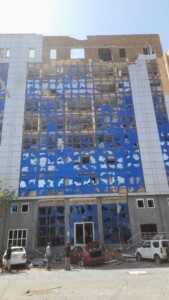Emirates partnerships ‘to help develop Sudan’s economy’
An agreement designed to enable banks to perform their role in the development of Sudan’s economy, has been negotiated between Sudan, the United Arab Emirates (UAE), and the private sectors, Sudan’s Acting Foreign Minister, Ali El Sadig, says.
 Chairman of the Sovereignty Council, Gen Abdelfattah El Burhan, disembarks following his return from the UAE on Sunday (Photo: SUNA)
Chairman of the Sovereignty Council, Gen Abdelfattah El Burhan, disembarks following his return from the UAE on Sunday (Photo: SUNA)
An agreement designed to enable banks to perform their role in the development of Sudan’s economy, has been negotiated between Sudan, the United Arab Emirates (UAE), and the private sectors, Sudan’s Acting Foreign Minister, Ali El Sadig, says.
El Sadig was speaking at Khartoum airport on Sunday the return from the UAE of a high-level delegation, headed by the Chairman of the Sovereignty Council, Gen Abdelfattah El Burhan.
He said that the Sudanese and Emirati delegations “agreed to establish large strategic economic partnerships in roads, ports, railway, military cooperation, and exchange of experiences”.
Workers at the sea ports in Red Sea state expressed their concerns about the privatisation of the Port Sudan port following the agreement between El Burhan and the Abu Dhabi’s heir apparent, on partnership in the field of sea ports.
Sea ports workers leader Osman Taher told Radio Dabanga that the UAE ports are a major competitor to the Red Sea ports and therefore cannot partner. He expressed the workers concerns over the port of Port Sudan. The agreement with Abu Dhabi may lead to the closure of the Port Sudan port in favour of the UAE ports.
He pointed to the high shipping cost from global ports to Port Sudan of $12,000 for a container compared to $8,000 to the Egyptian ports, and said that shipping companies as well expect the closure of the Port Sudan port.
Economy
Unprecedented stress on the Sudanese Pound against major currencies, coupled with unbridled prices for basic goods, is prompting fears of a famine as hunger is already prevalent throughout Sudan, and now begins to encroach on the capital Khartoum.
Last week, the Central Bank of Sudan announced the unification of the Sudanese Pound exchange rate to allow for the determination of currency exchange rates without interference from the Central Bank, while the price for a US Dollar jumped to a record SDG580 on the parallel market.
As highlighted by Economist Hasan Bashir in an interview with Sudan Today on Radio Dabanga that the full liberalisation of the exchange rate in the absence of enough foreign exchange reserve will lead to the continued rise in foreign exchange rates in the parallel market, and explained that “banks will remain in a continuous state of chasing the parallel market rates”. He said the resolution could be addressed part of short-term implications but was not a sustainable solution.











 and then
and then